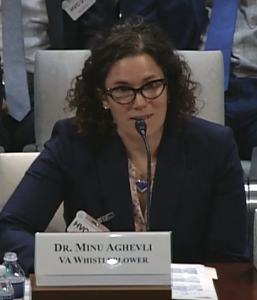WASHINGTON — In 2014, Katherine Mitchell, MD, was one of a handful of employees at the Phoenix VAMC who blew the whistle on hospital leadership for keeping a separate, secret list of veterans seeking healthcare—a numerical sleight-of-hand that allowed them to artificially decrease the facility’s wait times. The revelation would make national headlines and shine a spotlight on problems veterans have accessing care, and its reverberations are still being felt today.
A few months after Mitchell and her colleagues came forward, Minu Aghelvi, PhD, a Baltimore VA psychologist working in opioid addiction treatment was asked by her superiors to begin to remove veterans from the electronic waitlist and give them appointments in an imaginary clinic. According to Aghelvi, her superiors were concerned that their long waitlist would draw Congress’ attention in the wake of the revelations at Phoenix. Aghelvi subsequently blew the whistle on what was going on at the Baltimore VA.
Both testified before Congress last month that, five years on, they are still the targets of constant, insidious retaliation from VA superiors. The day prior to her testimony, Aglelvi was informed that VA was beginning the process of terminating her employment, a move she suggested is punishment for speaking out and a warning against any other VA employees who are considering coming forward about abuses at the agency.
“Two weeks ago, I told my supervisors that I was going to testify at this hearing. I sent them a copy of the invitation. Yesterday, I was informed that they were starting the process to remove me,” Aghelvi told members of the House VA Subcommittee on Oversight and Investigations. “Under the Whistleblower Protection Act provisions, this feels obviously retaliatory. Worse than that, I feel like I’m being used as a threat against other employees who might feel about speaking up about patient care concerns.”
While Mitchell’s whistleblowing made national headlines, and Aghelvi’s is relatively unknown beyond the Baltimore VA, the retaliation actions they revealed were similar. Both spoke of VA management stripping them of authority in ways that have been humiliating, and of superiors revoking their duties to so that they are unable to do the work they love.
“The retaliation never stopped. It just changed,” explained Mitchell. “Before, it was making me work unlimited hours without compensation or dropping my performance scores. Now it’s excluding me from any opportunity I have to participate in patient care. … For two years, I was banned from initiating contact with all medical center staff in my region. From 2014 to 2018, I had no regular assignments. Although I am trained as a VA quality scholar, I am excluded from almost every oversight activity, and I am not officially allowed to intervene in patient care problems.”
Aghelvi’s supervisors threatened to remove her as coordinator of the opioid agonist treatment program, rescinding the order at the last minute. Last year, after reporting concerns about a patient death, she was threatened with a reprimand. And earlier this year, the agency informed her they were summarily suspending her clinical privileges.
“The stated reason for this was that I had gone to visit a high-risk patient in a community hospital after he had overdosed, been treated in our ER, and then discharged. For the past two months I have forbidden from talking to any patients,” Aghelvi told the committee. “I’ve taken care of some of my patients for almost 20 years. I see some of them every day. They are like my family. It has broken my heart not to see them these last two months. Sometimes I am the most stable person in their lives. When I disappear, it affects them. Recovery from addiction is so difficult. It’s easy to give up on yourself when you think you’re not worth fighting for.”
Continue Reading:


